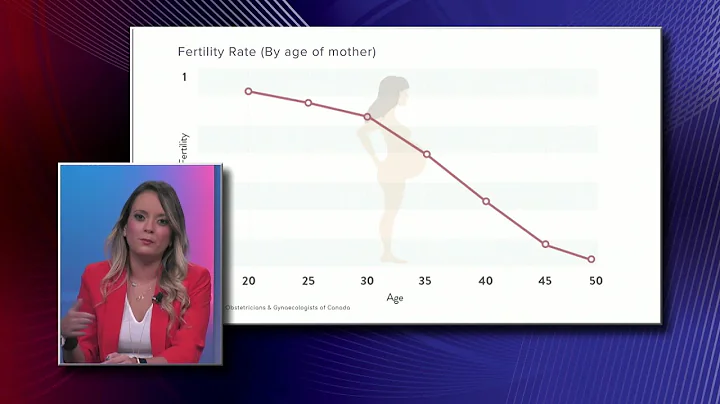At a time when women’s desire to have children continues to decline, pregnancy and childbirth are topics that some women avoid.
But behind the low fertility rate, there are still some women who are in the opposite situation - they are experiencing the hidden pain of not being able to give birth despite wanting to have one.
These women look forward to the arrival of their children, but one day the fetus in their belly suddenly freezes in the development process, stops growing, and has to be aborted.
Embryonic arrest (hereinafter referred to as "fetal arrest") is becoming more and more common in clinical practice.
On the "Xiaohongshu" APP, a lifestyle platform with many female users, I searched for the word "fetal arrest" and found as many as 50,000 shocking notes shared.
Some women have a sudden fetal arrest "without warning"; some women have experienced several fetal arrests and fell into collapse after their family members said "try again" every time; some women were 7 months pregnant. After experiencing fetal arrest, she said, "I waited for seven months to become a mother, but what I waited for was an empty confinement." Some women even compiled a "Self-Rescue Guide for Pregnant Women"...
This year In the spring, Fu Zhen, a woman with dual identities as a writer and blogger, published a novel "Zebra". The story in the book comes from Fu Zhen's personal experience 7 years ago - from 2012 to 2014, she experienced three fetal arrests, four uterine curettage surgeries, and a molar pregnancy.
In an exclusive interview with "People", Fu Zhen said: At first, I felt that fetal arrest was a small probability event, as if I didn't know that it would happen quietly, or just stop. After my first miscarriage, I thought my bad luck had run out. But the second pregnancy turned out to be even worse.
Women who long to have children, experience fetal arrest, suffer from psychological trauma, and blame themselves over and over again, whether they have done something wrong.
They help themselves, each other, and seek help from doctors.
In the obstetrician's and gynecologist's office, fetal arrest seemed like an unsolvable problem of the times.

In the Beijing Obstetrics and Gynecology Hospital affiliated to Capital Medical University, Chen Suwen, director of the Family Planning Department, has experienced 30 years of clinical changes. Thirty years ago, patients who came for an abortion took the initiative to ask for an abortion, often saying, "There is nothing wrong with this child, but I don't want it anymore." But things are different now. More women have to undergo abortion surgery for medical reasons. The proportion of patients with fetal termination in the total number of abortion surgeries continues to rise.
"Especially in recent years, the proportion of abortion operations among patients with fetal termination can reach 1/4, or even more." This means that 1 out of 4 women who have abortion operations does so because they want to Want it but can't.
After more and more clinical cases, doctors began to look for the cause. But so far, it is still difficult to find a definite answer.
"From the age of 20 to 30, I had 11 miscarriages due to fetal arrest."
Qingqing suffered almost all the tortures that a woman with fetal arrest might encounter.
"If I have another miscarriage, will you divorce me?" Qingqing has asked her current husband 7 times in total.
Between the ages of 20 and 30, the most fertile age group, Qingqing had 11 miscarriages and miscarriages. She sought medical advice everywhere and tried various treatments, but the fetus never lived past 50 days. Those fetuses that have never come into the world only grow an empty sac, without a fetal bud or a fetal heart.
Fetal arrest started without warning.
It was nearly 10 years ago, when Qingqing was 20 years old and met her first husband. According to the requirements of the husband's family, both parties need to get engaged first, and the marriage cannot be consummated until a child is born. In the more than two years after the engagement, she had four miscarriages. She went to the county hospital repeatedly, prescribed traditional Chinese medicine and took progesterone to protect her fetus, but she never gave birth smoothly. Her husband's family was very dissatisfied and forced her to break off the engagement.
After undergoing four fetal termination surgeries, the anxiety of being abandoned engulfed her uncontrollably. Qingqing was afraid that she would never be able to start a family because she was unable to have children. Qingqing quit her previous job and saved 200,000 yuan for medical treatment by working part-time for three years. But after spending all the money, the cause of the disease still could not be found.
html When she was 124 years old, Qingqing met her current husband.
"I didn't dare to tell him my secret. When my baby stopped for the fifth time after marriage, he thought it was my first time." Qingqing was burdened with huge psychological pressure and went to the provincial capital city to see a doctor. The doctor suspected that it was an immune system problem and recommended her to undergo a 21-day course of blocking antibody immunotherapy.
Since her husband carries hepatitis B and is contagious, treatment requires extracting white blood cells from the blood of a third-party male and injecting them into Qingqing’s arm. She invited people to participate in the treatment throughout the entire process, paid her salary, treated her to meals, and spent a lot of money, but it still failed.
At that time, Qingqing had already experienced 10 fetal arrests.
Life is like entering an unsolvable cycle - pregnancy, joy, fetal loss, surgery, despair - a full 10 times. Every time after hearing the doctor's verdict of fetal arrest, Qingqing's heart would sink and she would fall into infinite darkness.
The feeling of despair accumulates time and time again, and sensitivity and anxiety become conditioned reflexes.
"Over the years, my heart has been beating wildly before I even entered the consulting room for every examination, and my legs would tremble as soon as I lay on the bed during the B-ultrasound. Whenever I hear the doctor sigh, I can't help but start crying. I'm afraid that I will... After a miscarriage, I felt like there were so many things in my heart that I couldn’t hold them anymore,” Qingqing told 8:00 News.
In 2017, Qingqing decided to go to Shanghai to see a doctor. She found Bao Shihua, director of the Reproductive Immunology Department of Shanghai First Maternal and Infant Health Hospital, and then she learned that she had antiphospholipid syndrome, a strange-sounding disease. However, her 11th pregnancy still failed.
Antiphospholipid syndrome is an autoimmune disease. It is one of the clear causes of patients with frequent fetal arrests and habitual miscarriages. It is the crux of the problem that Qingqing has been unable to cure 11 times, because antiphospholipid syndrome even after treatment For formal clinical treatment, its success rate can only reach about 80%.
Until November 2019, Qingqing, who was pregnant for the 12th time, was lying in the B-ultrasound room, feeling numb inside. The doctor took the probe and drew circles on her belly. Suddenly, the doctor said he saw the fetal heartbeat.
Qingqing couldn’t believe it. After repeated confirmations, she was so excited that she ran to the corner of the hospital and cried. She thought to herself, no matter what happens this time, she must give birth to this child.
For regular check-ups, Qingqing moved into a rental house near the hospital alone, went for B-ultrasounds three times a week, and bought a fetal heart rate monitor. But the machine I bought was not as good as the one in the hospital, and it was difficult to identify the fetal heart rate. “I wish I could buy a B-ultrasound machine and carry it on my body to test my child every day.”
At 25+5 weeks of pregnancy, the fetus was found to have missing umbilical blood flow. Qingqing went to three major hospitals in Shanghai, and the doctors all advised her to have an abortion because the fetus might stop developing within a week. But Qingqing was determined, and in the end, under the close supervision of doctors, she managed to keep the pregnancy alive for another month.
The fetus' development was severely delayed at 34 weeks, and finally the doctor decided to perform an emergency caesarean section for Qingqing. Although my daughter was very small after birth, weighing only 840 grams, she was relatively healthy, which was beyond everyone's expectations.
html Over the past 110 years, a total of 700,000 was spent during the Qing Dynasty. "The medicine you took can be packed in sacks."
After Qingqing’s daughter was born, Dr. Bao Shihua named her “Qianfan”. Bao Shihua said to Qingqing, "You almost received more than a thousand injections in your belly. After going through a lot of hardships, you finally gave birth to the child. I hope she will have smooth sailing in the future."
The unstoppable fetal arrest clinic
Qingqing’s experience is not an isolated case.
Many clinicians reported to 8:00jianwen that fetal arrests have occurred more and more in recent years.
The bad news known as "embryo arrest" mostly occurs in the first trimester (within 12 weeks of pregnancy). After the embryo grows to a certain stage, it stops normal development. For doctors, if the pregnancy products can be smoothly discharged from the body, it becomes a natural abortion. If they remain in the body, they need to be discharged artificially.
In fact, strictly speaking, "fetal arrest" is not a diagnosis, but a staged performance in the process of spontaneous abortion.
Duan Tao, the former director of Shanghai No. 1 Maternal and Infant Health Hospital, told 8:00 News that the so-called "fetal arrest" is more due to imaging diagnosis: during the fetal development process, there is an embryo sac but no embryo, or there is The embryo has no fetal heart, and the fetal heart has stopped growing. Clinically, fetal arrest does not have any symptoms or signs such as abdominal pain or vaginal bleeding. It is neither threatened abortion, nor missed abortion, nor inevitable abortion. It cannot be classified into the existing diagnosis of abortion, so this textbook appeared "Fetal arrest" does not exist.
In reality, this means that some fetal arrests and spontaneous abortions will occur outside the hospital, while the other part will be included in the number of abortions in the hospital.
Due to the vague definition, it is difficult to count the number of fetal arrests. Currently, there are still no official data on fetal arrest at the national level.
Although there are no national statistics, many obstetricians and gynecologists have been keenly aware that the number of cases of fetal arrest has been accelerating over the years.
Chen Suwen, director of the Family Planning Department of Beijing Obstetrics and Gynecology Hospital Affiliated to Capital Medical University, is deeply touched by this. Last Friday (June 17) alone, 14 of the 40 patients who underwent abortion surgery by Chen Suwen had fetal arrests.
She told 8:00 News that when she first graduated and started working more than 30 years ago, there were very few cases of fetal arrest, only single digits a year, and everyone treated it as a special case to discuss and study. However, in the past decade or so, the number of cases of fetal arrest has increased significantly.
Chen Suwen believes that the trend of fetal arrest is becoming more and more serious. The family planning department where he works has shifted its focus in recent years, from "population control" to "solving the problem of being unable to have children." Fetal abortion has become a key project of the department. Three years ago, the hospital even opened a specialized outpatient clinic for fetal termination.
"In 2016, the country promulgated the two-child policy. In 2017, leaders from the National Health and Family Planning Commission and the Beijing Municipal Health and Family Planning Commission came to our hospital to conduct research and asked why there was a large discrepancy between the expected number of births and the actual number of births. There is a gap. I told him based on the clinical situation that because a large number of fetuses die in the belly, we have treated a considerable number of patients with fetal arrest here." Chen Suwen said.
Fang Aihua, a member of the Shanghai Family Planning Expert Group and chief physician of the International Peace Maternal and Child Health Hospital affiliated to Shanghai Jiao Tong University School of Medicine, told 8:00 News that due to the occurrence of spontaneous abortions outside the hospital, it is difficult to collect data on fetal arrest. She and her team counted the number of cases of fetal arrest among hospital inpatients and found that the data increased by 27.6% from 2017 to 2019 compared with 2014 to 2016.
Bao Shihua, director of the Reproductive Immunology Department of Shanghai No. 1 Maternal and Infant Health Hospital, told 8:00 News that he has encountered many patients with more than 10 fetal arrests in clinical practice, and there are even patients with as many as 17 fetal arrests. They sought medical treatment in many places, and even tried in vitro fertilization constantly, and their hair turned from black to white, but some of them were still unable to conceive.
Why did the fetus stop? The reasons are complicated and confusing
Frequent fetal arrests occur in individuals, which reflects the elusiveness of the causes of fetal arrests and the dilemma that cannot be prevented.
occurs uncertainly, with unclear triggers and unclear reasons - these all make women who experience fetal arrest feel desperate.
Some women who have experienced fetal abort have even asked: Why am I still the unlucky one despite taking good care of my baby and following a regular schedule?
On the "Little Red Book" App, women who experienced fetal abortism shared their experiences. Many people used words such as "no warning" and "unlucky" to describe the unprepared accident.
Clinically, the dilemma is the same. The pathogenesis of fetal arrest is unclear and has not yet been determined.
In recent years, medical research teams have been trying to solve the mystery of fetal arrest.
A review study published by the "Chinese Journal of Reproductive Health" in 2021 pointed out that the incidence of fetal arrest has increased year by year in recent years.In addition to the known genetic factors, endocrine abnormalities, infectious factors, immune factors, and thromboprone factors, there are still about 50% unknown factors in the pathogenesis of fetal arrest. There is no very clear and good prevention and treatment in clinical practice. method.
Defects in the embryo itself, problems in the development environment (reproductive system), even air pollution, and occupational stress may all be causes of fetal arrest.
Bao Shihua told 8:00 News that clinicians’ understanding and concepts of fetal arrest are actually constantly changing.
"More than 10 years ago, most doctors would have judged fetal arrest to be caused by embryonic abnormalities, and believed that the survival of the fittest embryos was the main cause of miscarriage," Bao Shihua said, "But since 2010, our hospital has established a specialized clinic for 'habitual abortion' Since then, similar outpatient clinics for recurrent miscarriage have gradually increased in other hospitals in the past five years. Doctors have gradually realized that for frequent fetal arrests and habitual miscarriage, survival of the fittest is only one of the causes of miscarriage, and patients themselves may also have miscarriage. Other causative factors, such as immunity, endocrine, prone to thrombosis, infection, etc.”
But what is certain is that the older a woman is during childbearing, the higher the incidence of fetal arrest. Medically speaking, a pregnancy in a woman over the age of 35 will be defined as a high-risk pregnancy during prenatal care.
Cheng Linan, the former director of the Shanghai Family Planning Technical Guidance Institute, told 8:00 News that the causes of fetal abort are very complex, but as women get older, egg quality declines, and other diseases increase, the incidence of fetal abort will increase. high.
"Basically half of the pregnancies among pregnant women over 45 years old will result in miscarriage."
According to statistics from the Shanghai Health Commission, the average age of first childbirth for women with registered permanent residence in Shanghai in 2020 was 30.73 years old. According to China's 2015 mini-census data, the average age of first childbirth for Chinese women has increased from 24.1 to 26.3 years old in the past 25 years. The optimal childbearing age for women should be between 25 and 30 years old.
In our country, the current status of women's childbearing age is that the age of women who give birth to one child is being pushed back; at the same time, with the liberalization of the two-child and three-child policies, the number of older mothers has also increased.
When these women raising children come together in clinical practice, they will inevitably see an increase in the number of fetal arrests.
Chen Suwen noticed that after the two-child and three-child policies were liberalized, more and more elderly mothers from remarried families and families who lost their only child came to see a doctor. However, many pregnant women feel that since they successfully gave birth to their first child, subsequent pregnancies and childbirths will naturally go smoothly, and then they ignore early screening, resulting in fetal termination due to genetic factors.
"Actually, the country's fertility strategy has changed a lot in recent years." Yu Shasha, director of the obstetrics department at Beijing United Family Hospital, told 8:00 News that late marriage and late childbearing are not currently advocated, and the public's concept must also change accordingly. Take advantage of it while you are young. Giving birth, the risk of fetal arrest will be lower.
Duan Tao believes that with the development of imaging, in vitro fertilization and other technologies in recent years, various screening and diagnosis times are getting earlier and earlier, and the granularity is getting finer and finer. The expansion of screening scope has made more fetal stops visible, and the broadening of statistical caliber is also the reason for the increase in fetal stops.
Fertility anxiety behind fetal arrest
A silent belly breaks women’s imagination of fertility.
After experiencing fetal arrest, many women suddenly realize that embryonic arrest is something beyond their control.
Fu Zhen wrote in the novel "Zebra": Once upon a time, she was sure that all her dreams - studying abroad, a lawyer's license, a happy marriage, a new and important life - would be waiting for her somewhere, Like a well-trained dog waiting for its owner.
However, fetal failure disrupted everything that was planned. Fetal arrest turned herself into an "abnormal woman."
In an interview, Fu Zhen said that the stigma of infertility is widespread. Pregnancy involves sex and the uterus, which itself is a taboo and difficult to talk about.At the same time, society has also constructed an image that infertility means that you cannot do what others can do.
After fetal arrest, women face pressure, not only the sense of crisis of being unable to have children, but also the fear of the disintegration of their marriage.
Bao Shihua told 8:00 News that patients often say to her anxiously, "Director, this is my last chance to get pregnant. Please help me protect my pregnancy. If this pregnancy protection fails, my marriage will be damaged." It's over."
Bao Shihua also met a pregnant woman who was extremely anxious. She had had three miscarriages. During her fourth pregnancy, she was extremely nervous, often forgetful, and couldn't even remember where her home was. At Dr. Bao's suggestion, the pregnant mother, accompanied by her husband, went to the Shanghai Mental Health Center for diagnosis and treatment by a professional psychologist. As a result, she was diagnosed with depression and needed to receive treatment at the obstetrics and gynecology department and the psychology department at the same time.
A 2016 study in the "Chinese Journal of Family Planning" pointed out that in addition to the grief and mourning for the loss of the child, mothers who have had fetal arrest will also have psychological sequelae in future pregnancies, such as depression and post-traumatic stress disorder. , anxiety, and side effects of mother-infant attachment, etc., can also have a negative impact on fathers.
Unexplained fetal arrest, especially, can cause couples to fear pregnancy.
In Fu Zhen’s view, maternity hospitals should be equipped with psychiatrists, whether during pregnancy or postpartum, there should be psychiatrists to provide psychological counseling to pregnant women, parturient women and women with fetal arrest.
From a more macro perspective, after women experience fetal termination, in addition to fertility anxiety, there is also a stronger social anxiety behind it, which is also related to today's social concepts.
In Duan Tao's view, modern society is becoming more and more impatient, and time and space are extremely compressed and folded. People generally lose patience and cannot tolerate any delay. Even the diagnosis of infertility has been shortened from 2 years to 1 year.
"The statistical caliber has become wider, and most of the originally natural fetal arrests are regarded as abnormal, which will also make women excessively anxious and worried about fetal arrests." Duan Tao said.
(Qingqing is a pseudonym)
Shi Chenjin|Writer
Li Lin丨Editor
This article was first published on the WeChat public account "Eight Points Health" (ID: HealthInsight)
Respect the original copyright and do not reproduce without authorization. You are responsible for infringement





















